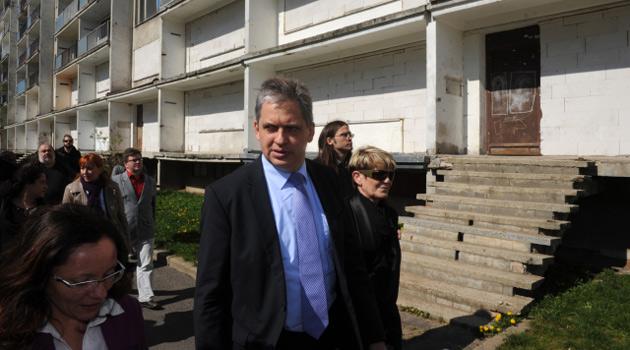Czech Human Rights Minister meets with Janov residents, few of them Romani

Residents of the Janov housing estate in the Czech town of Litvínov (Most district) are calling the situation in the locality unmanageable. During a meeting today with Czech Human Rights Minister Jiří Dienstbier (Czech Social Democratic Party – ČSSD) the residents asked for concrete aid.
The minister met with local residents and representatives of the Krušnohor apartment cooperative and promised money for social projects. He was the second cabinet member to visit Janov in short succession.
Last week Czech Labor and Social Affairs Minister Michaela Marksová visited Janov as well. Krušnohor either owns or manages almost 1 300 apartment units at Janov and recently organized a petition that was supposed to draw attention to the allegedly complicated coexistence with socially vulnerable people there, mainly Roma.
Dienstbier: I want to form an objective picture
Dienstbier toured a prefabricated apartment block on Jiřetínská Street that has been trashed and then visited a primary school, where a choir performed for him. He met with the public at the Jaklík drop-in center.
"The aim of the visit was to form an objective picture of what has happened here," said the minister, who toured the housing estate on foot. "At first glance it doesn’t look so bad here, with the exception of the empty buildings. It’s inside the buildings where what is going on becomes completely visible," he told news server Deník.cz.
Residents, however, believe the minister didn’t see what is essential. "Why didn’t you take a look at the entrances where there is filth and garbage, where other people’s property is being destroyed and one is afraid to complain for fear that one’s car might be destroyed in the morning as well?" Eva Marešová reproached the minister.
"I’m not satisfied with the result of this visit, we wanted to hear how many more crime prevention assistants will be made available, how the rights of the property owners will be enhanced, when we will be able to hire caretakers," František Ryba, the chair of Krušnohor, told the Czech News Agency. "The situation is unmanageable."
"Back in 2008 [former Human Rights Minister] Džamila Stehlíková was already claiming that ‘time’ is what is needed for a solution, as have her successors," Ryba said. As for a Romani perspective, Ondřej Kocúr, one of the few Romani residents to attend the meeting with the minister, said he had mixed feelings about it.
"On the one hand Mr Dienstbier is very open to various opinions, but on the other hand, what can one minister do?" Kocúr asked news server Romea.cz. Zdeněk Kvapil, chair of the local settlement committee, warned that children’s gangs have been created which he believes are destroying the public spaces and devastating private property at Janov.
"There’s spit on the staircases, human feces by the front doors and noise at night," described Renata Poláková. She was with those asking the minister for concrete aid.
In his debate with the citizens, Dienstbier summarized the Government’s legislative steps, mentioned that the number of bureaucrats at Labor Offices will be increased, and promised money for projects in municipalities that have problems with socially excluded localities. He believes that as much as CZK 10 billion [EUR 365 million] might be available for such projects during the next seven years.
Mayor of Litvínov Kamila Bláhová (ANO) told the Czech News Agency that at the end of April town councilors will approve a memorandum on collaboration between the town and the Czech Government Agency for Social Inclusion. "We are planning concrete projects already and we will do our best to raise as much money as we can for them," she said.
Romani people offered apartments only at Janov
According to Ondřej Kocúr, who has long worked with the ROMEA organization, this bad situation is the consequence of errors committed by the various local leaders that have been in charge of Litvínov since the 1990s. "They sold off all of the town’s housing stock to private owners, who have gradually moved impoverished people from all over the Czech Republic to Janov," he said, recalling an ongoing case in which Romani people have been systematically moved into the housing estate.
That case is already being investigated by the Czech Trade Inspectorate (Česká obchodní inspekce – ČOI), which announced at the beginning of April that it is launching an administrative proceedings against the CPI BYTY firm, which it previously audited on suspicion of discriminating against Romani clients. Kocúr recalled that on the basis of dozens of complaints filed by Romani clients with the ROMEA organization regarding the suspected discriminatory approach of the Litvínov branch of CPI BYTY, ROMEA filed a motion at the end of September last year with the Public Defender of Rights (the ombud), which subsequently raised the case with the Central Inspection Authority of the ČOI.
ROMEA’s motions to the ombud and then to the ČOI pointed to facts that demonstrated the systemic direct discrimination of Romani people whom CPI BYTY was rejecting when they applied to lease apartments in Litvínov that the company was advertising to the public. The only exception was for units at the Janov housing estate.
The situation at Janov has long been tense. In 2008, neo-Nazis exploited local dissatisfaction and repeatedly convened anti-Romani marches in the town, during which they clashed with police.
Dienstbier’s visit to Janov and the larger town of Litvínov is one of several trips he has made around the issue of social inclusion and the situation in excluded localities. On Monday, 13 April he visited the towns of Bruntál, Krnov and Osoblahu, and prior to that he has visited Ostrava and other areas.